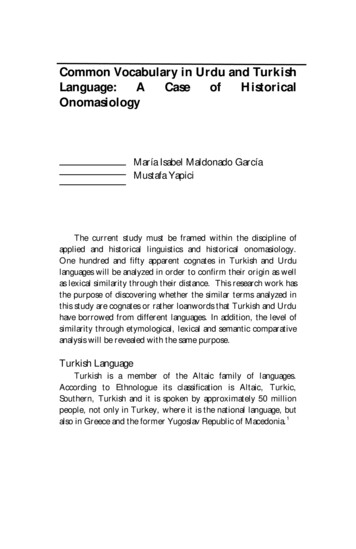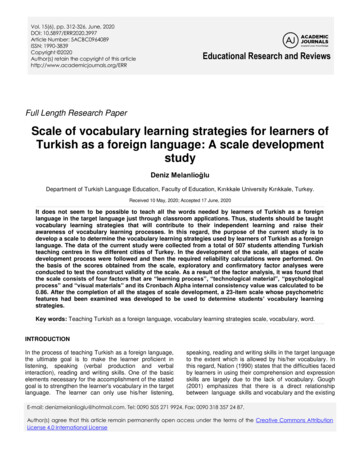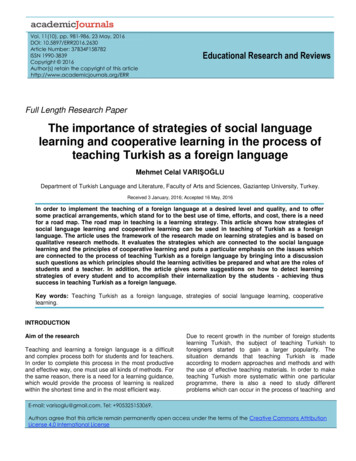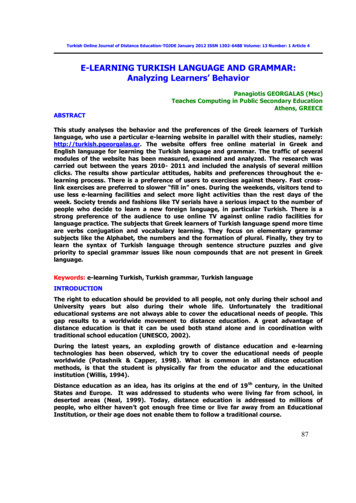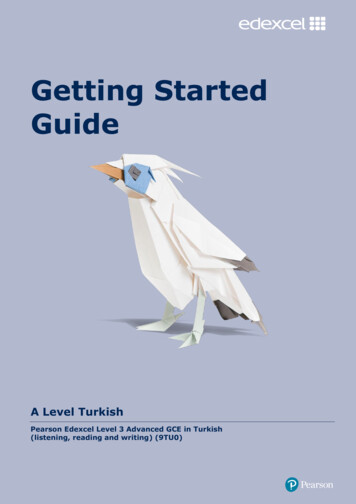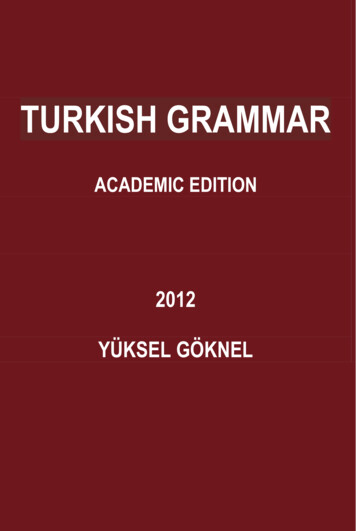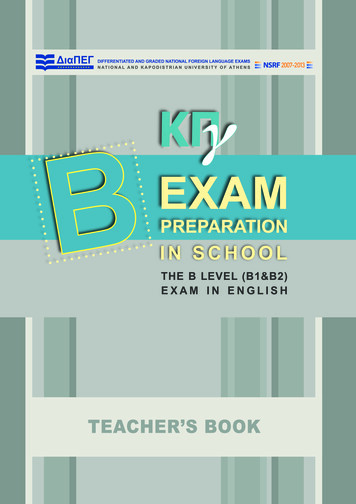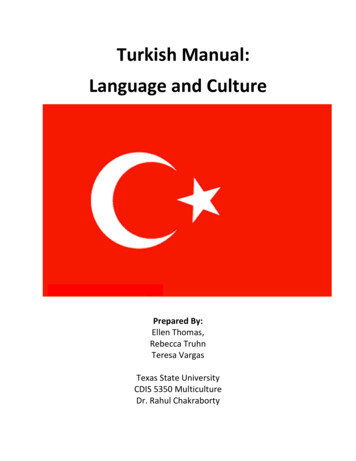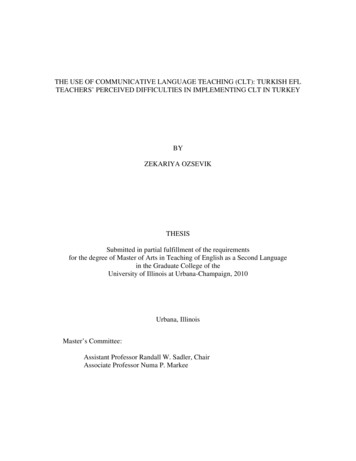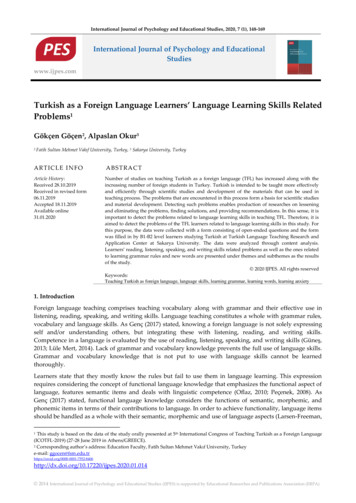
Transcription
International Journal of Psychology and Educational Studies, 2020, 7 (1), 148-169International Journal of Psychology and EducationalStudieswww.ijpes.comTurkish as a Foreign Language Learners’ Language Learning Skills RelatedProblems1Gökçen Göçen2, Alpaslan Okur32 FatihSultan Mehmet Vakıf University, Turkey, 3 Sakarya University, TurkeyA R TIC LE I N F OA BS T RA C TArticle History:Received 28.10.2019Received in revised form06.11.2019Accepted 18.11.2019Available online31.01.2020Number of studies on teaching Turkish as a foreign language (TFL) has increased along with theincreasing number of foreign students in Turkey. Turkish is intended to be taught more effectivelyand efficiently through scientific studies and development of the materials that can be used inteaching process. The problems that are encountered in this process form a basis for scientific studiesand material development. Detecting such problems enables production of researches on lesseningand eliminating the problems, finding solutions, and providing recommendations. In this sense, it isimportant to detect the problems related to language learning skills in teaching TFL. Therefore, it isaimed to detect the problems of the TFL learners related to language learning skills in this study. Forthis purpose, the data were collected with a form consisting of open-ended questions and the formwas filled in by B1-B2 level learners studying Turkish at Turkish Language Teaching Research andApplication Center at Sakarya University. The data were analyzed through content analysis.Learners’ reading, listening, speaking, and writing skills related problems as well as the ones relatedto learning grammar rules and new words are presented under themes and subthemes as the resultsof the study. 2020 IJPES. All rights reservedKeywords:Teaching Turkish as foreign language, language skills, learning grammar, learning words, learning anxiety1. IntroductionForeign language teaching comprises teaching vocabulary along with grammar and their effective use inlistening, reading, speaking, and writing skills. Language teaching constitutes a whole with grammar rules,vocabulary and language skills. As Genç (2017) stated, knowing a foreign language is not solely expressingself and/or understanding others, but integrating these with listening, reading, and writing skills.Competence in a language is evaluated by the use of reading, listening, speaking, and writing skills (Güneş,2013; Lüle Mert, 2014). Lack of grammar and vocabulary knowledge prevents the full use of language skills.Grammar and vocabulary knowledge that is not put to use with language skills cannot be learnedthoroughly.Learners state that they mostly know the rules but fail to use them in language learning. This expressionrequires considering the concept of functional language knowledge that emphasizes the functional aspect oflanguage, features semantic items and deals with linguistic competence (Oflaz, 2010; Peçenek, 2008). AsGenç (2017) stated, functional language knowledge considers the functions of semantic, morphemic, andphonemic items in terms of their contributions to language. In order to achieve functionality, language itemsshould be handled as a whole with their semantic, morphemic and use of language aspects (Larsen-Freeman,This study is based on the data of the study orally presented at 5th International Congress of Teaching Turkish as a Foreign Language(ICOTFL-2019) (27-28 June 2019 in Athens/GREECE).2 Corresponding author’s address: Education Faculty, Fatih Sultan Mehmet Vakıf University, Turkeye-mail: -8406http://dx.doi.org/10.17220/ijpes.2020.01.014 2014 International Journal of Psychology and Educational Studies (IJPES) is supported by Educational Researches and Publications Association (ERPA)
Gökçen Göçen, Alpaslan Okur2011). Activities for language use should be included in teaching process particularly for preventing what islearned from being forgotten (Kara, 2010). It is also important to bring in “communicational competence” inactivities to achieve language competency (Aktaş, 2005; Pilancı, 2009).Learners of a foreign language go through a process different from the process of acquiring their nativelanguage. In this process, they learn new rules and new words, and experience listening, reading, writing,and speaking skills all over again.Listening and reading are important receptive skills in terms of language exposure. Learners learn newlanguage rules and words through these skills. Speaking and writing skills are important productive skillsthat help put what is learned into use. The grammar rules that are not used with speaking and writing skillsremain as theoretical knowledge for learners.Listening —an important skill for understanding a language while learning it— plays a key role in learning aforeign language and is considered as the core of foreign language learning (Rost, 2011; Vandergrif, 2007).Considering learners, they perceive the listening in a foreign language as a difficult skill and fail to fullyachieve this skill effectively (Berne, 2004; Graham, 2006). Reading skills —defined as a process ofvocalization of written or printed signs according to predetermined rules and establishing an interpretationprocess that requires interaction between the writer and the reader (Akyol, 2006)— are also important inunderstanding and learning a new language. Reading skills require mental and physical effort for learners offoreign language in order to understand and vocalize a text.Speaking skill which is needed and utilized mostly for communication can be defined as conveyingemotions, thoughts and information through a language consisting of voices (Aktaş & Gündüz, 2001;Demirel, 1999). In this respect, speaking can be considered as a physical and mental process (Erdem, 2013).Speaking a language apprehensibly by learners is probably one of the most important skills of foreignlanguage teaching (Erdem, Şengül, Gün & Büyükaslan, 2015). For this reason, foreign language learners areexpected to acquire effective speaking skills. According to Chenoweth and Hayes (2001), writing skills take along time and are hard to acquire, so it may be an effortful experience. According to Çakır (2010), learnersand teachers experience the biggest challenges in writing skills. According to Barkaoui (2007: 44), the processof writing in a foreign language is affected by several factors such as linguistic, affective, and socioculturalones, and this fact is among the reasons why writing in a foreign language is a demanding and complicatedprocess. It is stated that TFL learners also have problems and difficulties in writing skills too often for similarreasons (Ak Başoğul & Selcen Can, 2014; Genç, 2017). The purpose of teaching writing skills to the TFLlearners is to enable them to write out their emotions and thoughts in compliance with the languageproperties of Turkish in a planned way (Tiryaki, 2013).Grammar functions as a tool for correct and effective use of language skills in the process of learning aforeign language. The reason for teaching grammar is to have learners comprehend the language they arelearning (Genç, 2017). In this sense, as Derman (2010) stated, teaching grammar is of vital importance.Grammar should not be handled as a separate field where rules are memorized, but as a whole together withother language skills where rules are implicitly presented (Göçen, 2019). In this process, it is important tocarry out grammar teaching along with other language skills and activities (Eroğlu & Sarar Kuzu, 2014;Göçen & Okur, 2013; Sağır, 2002). For this, methods revealing the functional aspect of grammar should beemployed (Dik, 1979; İşcan, 2007).Words function as tools for conveying emotions, thoughts, wishes, and ideas while learning a foreignlanguage. It is important for learners to have sufficient vocabulary knowledge for effective use of languageskills because, as Genç (2017) stated, conveying thoughts starts at word level; words turn into sentences, andsentences turn into structures that constitute paragraphs. While the similarities among languages facilitatelearning a foreign language and vocabulary, the weak relationship among languages generally leads todifferentiation of vocabulary, and learners may need to obtain information on the meanings/uses of wordsall over again (Odlin, 1989; Türkoğlu, 2004).Learners are expected to have problems related to learning and using the language while learning a newlanguage. The fact that competence in foreign language teaching may vary significantly among individuals(Açık, 2008) makes us think that the problems that learners encounter in the language learning process may149
International Journal of Psychology and Educational Studies 2020, 7 (1), 148-169also vary. It is important to detect these problems in order to ensure effectiveness in language teaching. AsAçık (2008) states, it is required to carry out assessment, identify the problems clearly, discuss them andoffer solutions in order to achieve the purpose of language teaching. There are studies for identifying theproblems related to teaching TFL and it is found in these studies that the problems related to the matterssuch as program, teacher, method, teaching equipment, material use in the related field are indicated andsolutions are offered. Some of these studies are as follows: Açık, 2008; Akkaya & Gün, 2016; Biçer, Çoban &Bakır, 2014; Bulut, Kanat Soysal & Gül Çiçek, 2018; Bülbül & Güven, 2017; Candaş Karababa, 2009; Chang &Kalenderoğlu, 2017; Derman, 2010; Durmuş, 2013; Er, Biçer & Bozkırlı, 2012; Kara, 2010; Maden & İşcan,2011; Moralı, 2018; Mutlu & Ayrancı, 2017; Özdemir & Arslan, 2018; Özyürek, 2009; Yılmaz, 2015. Besidesthese, there are also studies where problems are described by focusing on a single subject area or several ofthem for teaching TFL. Some of them are: Boylu, 2014; Kahraman, 2018; Kaldırım & Degeç, 2017; Nurlu &Kutlu, 2015; Tiryaki, 2017; Tüm, 2014. There are also studies employing error analysis in order to reveal theTFL learners’ problems: Adalar Subaşı, 2010; Ak Başoğul & Selcen Can, 2014; Bölükbaş, 2011; Büyükikiz &Hasırcı, 2013; Çerçi, Derman & Bardakçı, 2016; Çetinkaya, 2015; Fidan, 2019. When these studies areexamined, it is found that generally a single subject area, study group of single nationality or a singlelanguage level was taken for examination. Among them, the number of studies conducted with Arablearners on writing skills is the highest. However, when it comes to teaching TFL, problems should also beidentified for the language learners from different nations for reading, listening, speaking, and writing skills,and for grammar and vocabulary. There are no studies that handle all these skills all together. Also, it isfound that there are limited number of studies on grammar learning problems related to teaching of TFL andthere are not any studies specifically on vocabulary learning problems. Therefore, a study that comprise alllanguage learning skills as reading, listening, speaking, writing, grammar, and vocabulary includingdifferent learner characteristics is needed. In this regard, it is aimed to answer the following subquestionsbased on the research question “What are the problems of the TFL learners in language learning skills?”within the scope of this study: What are TFL learners’ problems in reading skill? What are TFL learners’ problems in listening skill? What are TFL learners’ problems in speaking skill? What are TFL learners’ problems in writing skill? What are TFL learners’ problems in grammar learning? What are TFL learners’ problems in learning new words?2. Method2.1. Research DesignPhenomenology —one of the qualitative research methods— is employed in this study to identify TFLlearners’ problems related to reading, speaking, writing skills, and grammar and vocabulary learning. AsYıldırım and Şimşek (2013) stated, phenomenology focuses on the phenomena people are aware of, butunable to fully understand.2.2. Study Group251 learners in total learning TFL at B1 and B2 levels formed the study group. Distribution of learners bylanguage levels is as follows:Table 1. Distribution of the Study Group by Language LevelsLevelFrequencyB1120B2131Total251150
Gökçen Göçen, Alpaslan OkurAccording to Table 1, it was found that language levels of the learners in the study group are close to oneanother. Distribution of learners by gender is as follows:Table 2. Distribution of the Study Group by ding to Table 2, it was found that the numbers of males and females in the study group are close.Distribution of learners by language level and gender is as follows:Table 3. Distribution of the Study Group by Language Level and maleTotalAs seen in Table 3, there is a balance between the number of males and females under language levels.Distribution of learners by age is as follows:Table 4. Distribution of the Study Group by AgeAge RangeFrequency17-2013821-255426-302531-43Not statedTotal826251According to Table 4, majority of learners in the study group are between 17-20 years old. Distribution oflearners by country is as follows:Table 5. Distribution of Learners in the Study Group by desh3Benin1Burkina Faso1Burundi2Algeria1Chad5Democratic Republic of the Congo2Indonesia60Morocco4Ivory Coast2Palestine9The Gambia1Guinea2South Sudan1Georgia1India1151
International Journal of Psychology and Educational Studies 2020, 7 (1), stan17Kenya1Kyrgyzstan3Kosovo1Madagascar1North nmar1Niger1Nigeria1Central African Republic1Pakistan3Russia1Senegal1Sierra and4Tunisia2Turkmenistan1Uganda1Jordan5Yemen6Not statedTotal18251According to Table 5, it was found that most learners in the study group came from African and Asiancountries.2.3. Data Collection and AnalysisA form that consists of open-ended questions was used in order to identify TFL learners’ problems related toreading, listening, speaking, and writing skills and grammar and vocabulary learning. The form askedlearners to state the problems they have related to listening, reading, speaking, writing skills, and learninggrammar rules and vocabulary (new words) under different themes. Sufficient time was given to thelearners to answer all the questions and the completed forms were collected by the researchers. Only theforms that have been fully completed were included in the study. Learners’ responses were transformed intodigital format and analyzed under each research question by using Microsoft Office 365 Excel. Following thecontent analysis, the data were classified under themes and subthemes and presented in tables. To ensure152
Gökçen Göçen, Alpaslan Okurreliability, expert opinion was sought for the themes and subthemes. To ensure validity, extracts from thelearners’ responses have been included in the tables.3. FindingsIn this study, TFL learners expressed their problems related to reading, listening, speaking, and writingskills, and grammar and vocabulary learning. The following table states the number of problems expressedby the learners:Table 6. Number of Problems Related to Language Learning SkillsSkillsReading SkillListening SkillSpeaking SkillWriting aryLearning230According to Table 6, the number of problems (from highest to lowest) related to the language learning skillsexpressed by TFL learners is: Listening skill, reading skill, writing skill, speaking skill, vocabulary learning,grammar learning. Accordingly, it was found that learners expressed more problems related to the listeningand reading skills compared to other areas of comprehension skills. While learners mentioned listening skillas the most problematic, they regarded the grammar learning as the least problematic one.3.1. Findings and Comments on TFL learners’ Problems in Reading SkillsReading skills related problems of TFL learners were analyzed. Their problems related to the reading skillswere classified under the following themes:Table 7. Themes on Reading Skills Related ProblemsThemesFrequencyProblems Related to Comprehension111Linguistic Problems12Problems Related to Reading Text81Problems Related to the Action of Reading49Problems Originated in Learners7Problems Related to Teaching Process14Total274According to Table 7, learners expressed the highest number of reading skills related problems under thetheme “Problems Related to Comprehension”. In addition, learners frequently expressed problems underthe themes “Problems Related to Reading Text” and “Problems Related to the Action of Reading”.The problems expressed by TFL learners related to the reading skills were classified under the followingsubthemes:Table 8. Themes and Subthemes Related to the Reading SkillsThemes and SubthemesExampleProblems Related to ComprehensionUnknown rulesWords with figurative meaningFrequency111Reading a book is too difficult, because there are rules in it,and we haven’t learned these rules. (S72/B2)There are too many figurative meanings in Turkish. Therefore,I can only read but I cannot understand the subject/text. Manywords are too far from their basic meanings. (S146/B1)2113Long wordsSometimes, I cannot understand the long words. (S185/B2)4New suffixesSome suffixes are unfamiliar. (S2/B2)3Unfamiliar wordsThere are too many words I don’t know. I must translate themone by one. (S14/B2)62Difficult wordsThere are very difficult words in some reading texts. (S174/B1)8Linguistic ProblemsDifferences in language structures12My language and Turkish are quite different from each other.(S101)2153
International Journal of Psychology and Educational Studies 2020, 7 (1), 148-169Non-existence of some Turkish lettersin L1Difference of logic in TurkishSome letters in Turkish don’t exist in the Latin alphabet: ğ, ü, ı,ö. (S9)I think the most important problem is the logic. For example,Turkish logic is quite different for Arabic learners. (S2/B2)Problems Related to Reading TextFailing to understand the relationshipbetween the text and the questionText lengthI lose too much time, because the texts are too long. (S115)Inappropriateness for the levelSometimes, texts are too difficult and I have to read them acouple of times to understand. Sometimes, I cannotunderstand them at all. (S25)I don’t have problem in reading very much while learningTurkish, but texts are difficult for the learners at B1 and B2levels. (S3/B2)Difficult QuestionsQuestions are confusing and difficult. (S95/B1)Insufficient timeTime is too short. Sometimes, I am pinched for time inanswering the comprehension questions. (S114/B2)Problems Related to the Action of ReadingSuffixesInability to read fast381I understand the text well, but the comprehension questionsare different. There are too many synonymous words in thequestions. (S135/B1)Text difficulty732230941349Too many suffixes are used in Turkish. Therefore, reading is abit challenging. (S24)“Reading” is a bit difficult for me while learning Turkish,because I read a bit slowly. If I read fast, I make mistakes.(S136)110Difficulties in PronunciationFor me, pronunciation is difficult. (S101/B1)24Long wordsI cannot read long words. (S19/B2)12Unfamiliar wordsThere are a lot of new words. I must use a dictionary all thetime while reading. (S103/B1)Problems Originated in Learners27Lack of attentionI am careless. (S100)2Reading AnxietyI can read texts alone, but I feel a bit nervous when I read themin the class. (S170)2Lack of reading practiceI must read more texts and paragraphs, but I don’t do it. (S14)3Problems Related to Teaching ProcessDifferences betweenthe contents of lessons and exams14The words used in the exam are not taught by the teachers inthe class. (S44)Total14274According to Table 8, the TFL learners have the highest number of reading text related problems under thesubtheme “Existence of new words”.3.2. Findings and Comments on TFL learners’ Problems in Listening SkillsThe problems of TFL learners related to listening skills were analyzed. Learners’ problems related tolistening skills were classified under the following themes:Table 9. Themes Related to the Problems in Listening SkillsThemesFrequencyProblems Related to Comprehension37Linguistic Problems14Problems Related to Listening Text165Problems Related to Speaker70Problems Originated in Learners15Problems Related to Teaching Process36Total337154
Gökçen Göçen, Alpaslan OkurAccording to Table 9, TFL learners expressed the highest number of listening skills related problems underthe theme “Problems Related to Listening Text”. Additionally, learners frequently expressed problems underthe themes “Problems Related to Speaker” and “Problems Related to Comprehension”.TFL learners’ problems related to listening skills were classified under the following subthemes:Table 10. Themes and Subthemes Related to the Problems in Listening SkillThemes and SubthemesExampleProblems Related to ComprehensionUnknown rulesLack of vocabulary knowledgeLong wordsUnfamiliar wordsDifficult wordsFrequency37New rules are difficult. For example, we can use some grammarknowledge in writing, reading, and comprehension, but it isdifferent when it comes to listening. It is hard to understand.(S2/B2)Listening is difficult for me because I don’t know a lot of words.(S236/B2)I don’t understand long words while listening. (S19/B2)There are many new and different sentences. Therefore, I cangenerally understand very few words. (S84/B1)Listening is the most difficult skill for us because words are hard tounderstand when there are semi-figurative, synonymous orantonymous words. (S240/B2)Linguistic Problems47324614Differences in daily languageI have a lot of problems in listening. For instance, I can understandvery well when the teachers at school speak, but their speech isquite different from the Turkish spoken in daily life. (S3/B2)I can listen and understand the Turkish teacher, but I cannotunderstand Turkish people. (S93/B1)8Accent differencesThere are differences among traditional accents in Turkish. (S86/B1)5Difference of logic in TurkishThe logic in our language is quite different. (S2/B2)1Problems Related to Listening Text165Pace of listening inputMy Turkish friend talks too fast. (S123/B1)I can understand only a few words or sentences in exams. (S246/B2)Complicated listening textsIt is generally complicated. (S189/B2)3Differences in subjectsFor example, we can understand the texts about technology, healthor family, but sometimes a text about GMO (for example) is givenin the exam. (S82/B2)6Text lengthListening is too long. (S209/B1)5Texts inappropriatefor the levelListening texts are not appropriate for our level. Turkish is spokenin the countries of some students, but it is difficult for us asAfricans. (S44/B2)2Text difficultyListening texts are difficult. (S111/B2)Unclarity of questionsQuestions. (S8/B2)Incomprehensible questionsLength of questionsDifficulty of questionsNo revisionLack of timeAnswers of the listening questions were not provided. I didn’tunderstand the questions. (S43/B2)I generally understand everything and listen well, but the listeningquestions in exams are too long. (S75/B1)Questions are difficult, and words with the same meaning are used.(S124/B1)Sometimes, I need to listen more than once, but it isn’t possible.(S29/B2)I need more time to understand the listening texts. (S119/B2)Problems Related to SpeakerPace of the speakerMisarticulation9518461351770Sometimes, I don’t understand the people who speak fast in amarket or shopping center, and I say “Please, say it again.” (S25/B2)I think some teachers speak in a way that is hard to understand.(S26/B2)4410155
International Journal of Psychology and Educational Studies 2020, 7 (1), 148-169Volume of speakers’ voiceBecause they speak like they are murmuring. I can’t hear. (S123/B1)Differences in pronunciationWhile learning Turkish, I can’t understand some words in“listening” due to the manner of pronunciation. (S23/B2)Problems Originated in LearnersFailing to pay attentionFailing to remember what is listenedFailing to form an interactionLack of listening practice1015I can’t pay attention to words. (S178/B1)Some people can’t remember a listening text well. I’m not good atremembering it, either. (S234/B2)I don’t speak with and listen to people regularly, so I haveproblems. (S200/B2)Problems Related to Teaching ProcessDifferences betweenthe contents of lessons and exams651236Listening questions are quite simple in the class. But they are a bitharder in the exam. (S46/B2)We cannot make any progress; we only listen to texts from thebook. We listen to them, but we cannot understand. We still don’tknow how to answer the questions easily. (S104/B2)It would be better if there is more listening practice in the courses.(S211/B1)Listening practice should be made once every day. (S240/B2)Total1521337According to Table 10, TFL learners expressed the highest number of problems under the subthemes “Paceof listening input”” and “Pace of the speaker”.3.3. Findings and Comments on TFL learners’ Problems in Speaking SkillsTFL learners’ speaking skills related problems were analyzed. The problems of learners related to thespeaking skills were classified under the following themes:Table 11. Themes Related to the Problems in Speaking SkillsThemesFrequencyProblems Related to Expression25Linguistic Problems10Problems Related to Anxiety and Excitement27Problems Related to the Action of Speaking19Problems Related to Speaking Text10Problems Related to Language Use45Problems Originated in Learners43Problems Related to Teaching Process46Total225According to Table 11, learners expressed the highest number of speaking skills related problems under thetheme “Problems Related to Teaching Process”. Besides, learners frequently expressed problems under thethemes “Problems Related to Language Use” and “Problems Originated in Learners”.TFL learners’ problems related to speaking skills were classified under the following subthemes:Table 12. Themes and Subthemes Related to the Problems in Speaking SkillsThemes and SubthemesExampleProblems Related to ExpressionFrequency31Failing to use academic languageI can speak only a little in academic matter. (S25/B2)Lack of vocabulary knowledgeI still don’t know many words for speaking well. (S102/B2)Failure in self-expressionI still can’t express myself. (S38/B2)4Not knowing the context of conversationI know a lot of words, but when and in which context should Iuse them? (S29/B2)5Failing to speak like a native speakerI can’t speak like Turkish people. (S93/B1)1Linguistic Problems61510156
Gökçen Göçen, Alpaslan OkurDifferences in language structuresDifferences in daily languageSentence structure is different from my native language.Therefore, I feel like I must think twice before speaking. (S24/B2)The Turkish language I use in daily life and the one I learn in thelessons are a bit different, so I sometimes cannot understandeasily. (S244/B2)Problems Related toAnxiety and ExcitementGetting excitedGetting into panicExperiencing exam anxiety8227I cannot speak due to anxiety. (S195/B2)I get into panic, because nothing comes to mind due to panicwhen I need to find an answer on a topic. (S205/B1)I experience anxiety too much in speaking exams. They askquestions to all students. Everybody speaks, so I get excited.(S177/B1)427Getting stressedSometimes, I can’t give an answer because of stress. (S109/B2)5Being afraid of making mistakesSpeaking is the biggest problem for me. I want to speak, but Idon’t want to make a mistake. I want to talk to my friends at thedormitory, but I only give short answers due to being afraid ofmaking a mistake. (S211/B1)9Problems Related to Action of SpeakingFailing to speak fastFailing to pronounce wordsHaving difficulties in pronunciation19I still cannot speak fast. (S19/B2)I pronounce front vowels as back vowels, back vowels as frontones. (S48/B2)My pronunciation is bad. (S178/B1)I cannot speak Turkish due to having difficulty in pronouncingthe words. (S227/B2)Problems Related to Speaking Text86510Difficult topicsIt is hard to speak on some topics. For instance, “Where can Itravel in summer holiday? Can I give an advice?” I have justcome to Turkey. I haven’t travelled around Turkey yet. (S139/B1)3Difficult questionsSome questions are difficult. (S167/B1)2Lack of timeThere are too many questions and not enough time to think. Imust give answers instantly. (S190)5Problems Related to Language UseFailing to use suffixesFailing to use the letters45I still make mistakes in case suffixes. (S1/B2)It is going better for now, but I still make mistakes, particularlyon suffixes. (S9/B2)I pronounce some letters incorrectly while learning Turkish.(S126/B1)63Failing to use wordsSometimes, I can’t remember words while speaking. (S37/B2)11Failing to apply the rulesSpeaking is not difficult for me, but I make many mistakesbecause I still haven’t learned most of the grammar rules.(S236/B2)24Problems Originated in Learners43Speaking in native languageAll the students in A1 class were my friends. They areIndonesian. I barely spoke Turkish at A1 level. (S204/B1)4Thinking in native languageI think in Indonesian in my mind. (S69/B1)2Lack of speaking practiceI don’t do practice much, so I cannot speak Turkish well. (S58/B2)Being afraid of the teacherLack of self-confidenceFailing to interact with nativesSpeaking is not difficult, but some teachers are tough (They don’ttalk to me or look at me at all.). So, we are afraid of them.(S210/B1)I am not self-confident, especially while talking to the Turks.(S121/B2)I barely talk to Turks, because I have few Turkish friends only inthe dormitory. (S21/B2)I have a great difficulty in improving my speaking because Idon’t have any Turkish friends.
aimed to detect the problems of the TFL learners related to language learning skills in this study. For this purpose, the data were collected with a form consisting of open-ended questions and the form was filled in by B1-B2 level learners studying Turkish at Turkish Language Teachi
